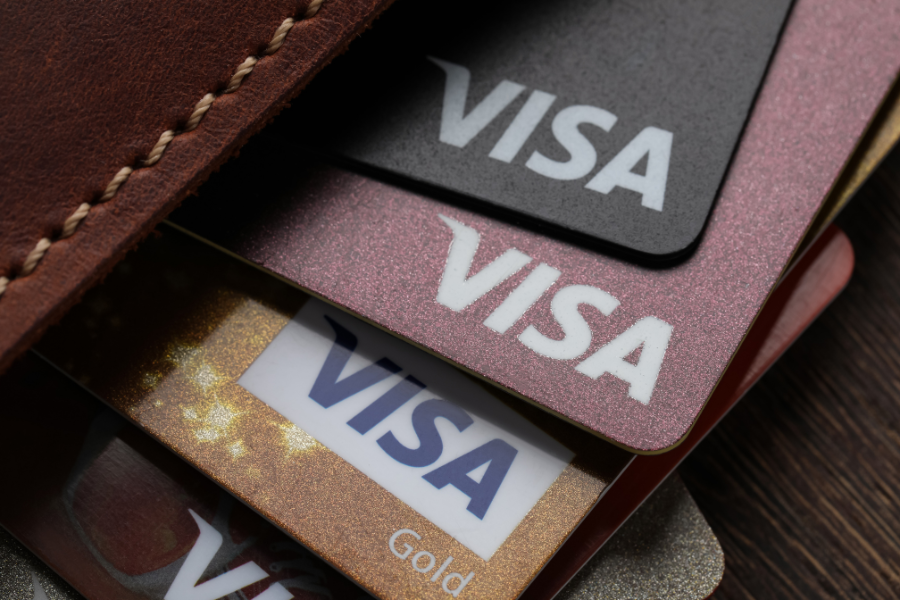I’m worried about you, especially with more and more people on the verge of maxing out their credit cards.
Credit cards are extremely convenient and easy to use. With the holidays coming up – Black Friday, Small Business Saturday, Cyber Monday, Hanukkah, Christmas – there are all kinds of incentives to buy. But with temptation to charge comes consequences at large.
Alarming Credit Card Debt Statistics
People are using their charge cards at very high rates – between 80-90% of availability. This is red alert territory.
According to LendingTree, as of December 2022, Illinois ranks 16th in the country for the highest average credit card debt per person ($7,756). Also, the 30-day delinquency rate – or the percentage of total outstanding credit card balances at least 30 days overdue – climbed to 2.77% by the second half of 2023. That’s the highest rate seen since Q3 2012.
Here are some more key statistics pulled from WalletHub’s national survey:
- 56% of Americans say they have more credit card debt than they did 12 months ago
- 57% of Americans with credit card debt say it will take them more than a year to pay it all off
- 54% of Americans say that credit cards overall have cost them more money than saved them money
- 23% of Americans are in debt because of frivolous spending
- 24% of Americans would move in with their in-laws to get out of credit card debt
For us, this is an early warning sign of bankruptcy. Credit card companies start dunning you when you are 60 days behind payment. They may even file suit and garnish your wages when you fall 90 days or more behind.
Want a brighter financial future? Speak with an experienced debt consolidation lawyer.
What Happens If You Max Out a Credit Card?
Having a maxed out credit card means that you’ve met or exceeded your credit card limit. You have no more borrowing power until you pay off the monthly minimum amount plus interest.
New spending habits must be created in order to pay off a maxed out credit card. Here are some ways you can do just that.
1. Hide Your Credit Cards
Yes, physically take out your maxed out credit cards from your wallet and lock them in a vault. Freeze your cards, then hide them in a secure and inconspicuous place – behind a picture frame, buried in a potted plant, inside the freezer.
You can also leave your cards with a loved one. This creates more visibility and accountability on your part for tackling the debt head-on, not continuing to build on it.
2. Remove Digital Wallets
Apple Wallet, Google Wallet, Amazon, Uber, Lyft, DoorDash – these are common places where you can store your payment information and make online purchases with just a single tap.
Remove saved credit cards from your apps and online accounts. If you need to make a purchase, use your debit card or a payment service that’s linked to your bank account like PayPal or Venmo.
3. Calculate What You Owe
The principal might be $4,000 right now, but you’ll need to pay off more than the minimum amount each month if you want to make a significant dent on your credit card balance.
We recommend using a credit card minimum payment calculator to determine exactly what your payment schedule must look like in order to wipe clean of your debt. Use this time to carefully examine your budget and cut out things that you don’t need.
4. Start Paying Off Your Debt
Figure out which credit card has the highest rate of interest and put as much as you can above the minimum payment on that card until you pay it off. Repeat with the card with the next highest rate.
Make sure to redeem any accumulated reward points you have accrued for spending or paying off your credit card balance. These statement credits will help speed up the repayment process.
5. Negotiate with Credit Card Issuers
Don’t have any money left over to pay your debt? Contact each credit card company and ask them to reduce their interest rate. It never hurts to ask. If you have good credit, you may be eligible to transfer one balance to another credit card.
Settle Your Debt with a Credit Card Debt Lawyer
Chapter 7 or Chapter 13 bankruptcy are last resort options to consider for outstanding debt. If you are being sued, garnished, can’t sleep, or can’t deal with your debt, contact David P. Leibowitz from Lakelaw – Chicago’s most trusted bankruptcy law firm.
At Lakelaw, we have represented over 10,000 cases in the past 50 years, helping our clients to confidently navigate through any financial crisis. We have also been recognized for excellence by every rating service in the industry including Super Lawyers 2024 and Martindale-Hubbell Client Champion 2023.
At Lakelaw, we represent you fearlessly and zealously. Contact us today to schedule a free confidential consultation.

